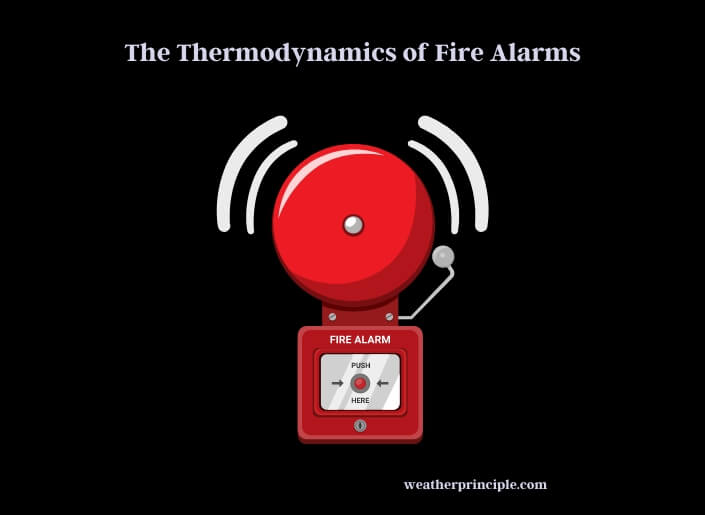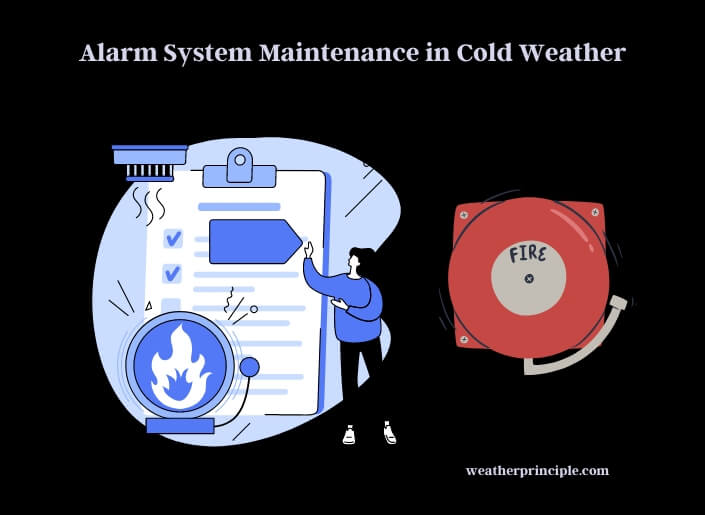Published on: July 22, 2023
Written by Shaown Khan / Fact-checked by Kader Khan
Yes, cold weather can indeed trigger your fire alarm. This is usually due to condensation forming inside the detection chamber, causing the alarm to sound.
During cold weather, your house alarm might go off, which can be surprising and a little perplexing. The culprit is the formation of condensation in the alarm’s detection chamber. You see, the sensor within the fire alarm is a particle sensing device. So, when the temperature drops significantly outside or a door adjacent to a heated area is opened, causing a sudden change in temperature, water condensation forms in the sensor. This leads the unit to sound an alarm, falsely signifying a potential fire threat.
You might wonder what temperature will set off a smoke detector. Unfortunately, there is no definitive answer as it varies based on the specific make and model of the detector. Yet, the change in temperature, and not the temperature itself, is typically what triggers these devices.
This mechanism can explain why your fire alarm randomly goes off in the middle of the night or why your smoke alarm keeps going off early in the morning. The temperature typically drops during these hours, potentially causing the condensation to form in the detection chamber.
Another factor to consider is your carbon monoxide detector. It’s worth mentioning that extremely cold temperatures can also affect these devices, although their operation differs from smoke detectors.
It might baffle you when a smoke alarm goes off without smoke, but remember, it’s not just smoke that sets off these alarms. Changes in environmental conditions, such as temperature fluctuations and humidity, can also lead to a false alarm.
The low temperature smoke detector operates based on a similar principle. When the temperature drops, the condensation forms, which can trigger the alarm. Despite these potential false alarms, do fire alarms turn off by themselves? While some models may have a self-resetting feature after sounding a false alarm, it’s not a standard feature across all makes and models. Manual resetting of the alarm may be required in some cases.
These aspects can help ease any anxiety that comes from your alarm going off unexpectedly and will aid in managing these situations more effectively.

Background of Fire Alarms
Historical Evolution of Fire Alarms
The development of fire alarms spans centuries, starting from manual systems to today’s sophisticated, automated technologies. A fire alarm’s primary goal hasn’t changed though; it serves to warn individuals about potential fire hazards, promoting prompt action and minimizing damage.
Constituent Parts and Their Roles
Fire alarms comprise numerous components, each playing a unique role in the system’s functioning. From the control panel, acting as the system’s brain, to detectors, power backups, and sounders, each component forms an integral part of a fire alarm system.
Key Components of a Typical Fire Alarm System
| Component | Role |
| Control Panel | Processes signals, initiates alarm |
| Detectors | Detects smoke, heat, or other signs of fire |
| Sounders | Emits loud noise to warn individuals |
| Power Backup | Provides power in case of electricity failure |
| Manual Call Point | Enables manual triggering of the alarm |
Principles of Fire Alarm Operation
Sensing Technologies: Ionization and Photoelectric Methods
Fire alarms leverage two core technologies for smoke detection: ionization and photoelectric. Ionization alarms are adept at detecting flaming fires, while photoelectric alarms excel in picking up smoldering fires. Both types bring their strengths, contributing to a safer environment.
Interpreting Alarm Signals: Smoke, Heat, and More
Fire alarms interpret various signals. These include excessive smoke or heat, potentially indicating a fire. Sophisticated alarms can even differentiate between different types of smoke and heat, making them more precise in their operations.
The Cold Weather Factor
Mechanics of Cold Weather: Frost and Condensation
In cold weather, phenomena such as frost and condensation can become common. Frost occurs on surfaces, while condensation happens when warm air meets a cold surface, resulting in water droplets.
Impact of Cold Weather on Daily Life and Electronics
Cold weather can influence both daily life and electronic devices. It can cause slower battery discharge, altered display functions, and in some cases, unexpected device behavior.
Summary of Cold Weather Effects on Various Electronics
| Electronics | Cold Weather Impact |
| Smartphone | Slower battery discharge, sluggish performance |
| Car Battery | Difficulty starting, reduced capacity |
| LCD Displays | Delayed response, diminished brightness |

Cold Weather’s Effect on Fire Alarms
Role of Condensation in Fire Alarm Triggers
Your smoke alarm may sound when it’s very cold outside, or if a door adjacent to a heated area is opened, like in an entryway. This is due to condensation (water vapor) in the detection chamber. The sensor is a particle sensing device, so water condensing in the sensor can cause the unit to alarm.
Examining Instances of Cold Weather Induced False Alarms
Cold weather can sometimes lead to false fire alarms. As condensation forms in the detection chamber of an alarm, the device may interpret these particles as smoke, triggering the alarm incorrectly.
Comparative Analysis of Fire Alarm Types in Cold Weather
Ionization Alarms vs. Photoelectric Alarms: Which is More Prone?
Ionization alarms and photoelectric alarms can respond differently to cold weather. In general, ionization alarms can be more susceptible to false alarms due to their sensitivity to smaller particles, such as those formed by condensation.
Analysis of Fire Alarm Performance in Extreme Weather Conditions
Various studies indicate that extreme weather conditions can influence fire alarm performance. It’s essential to consider these impacts when choosing and maintaining a fire alarm system.
Comparative Analysis of Fire Alarm Performance in Cold Weather
| Fire Alarm Type | Cold Weather Performance |
| Ionization | More prone to false alarms due to sensitivity to particles |
| Photoelectric | More resilient to false alarms in cold conditions |
Solutions to Cold Weather Induced False Alarms
Maintenance and Care Tips for Fire Alarms in Winter

Regular maintenance checks and proper positioning of fire alarms can help minimize false alarms during winter. Keeping the detection chamber clean and away from areas prone to rapid temperature changes can also help.
Choosing a Fire Alarm Resistant to Cold Weather Triggers
Selecting a fire alarm designed to withstand cold weather can be beneficial. Opt for models specifically designed to resist false alarms due to condensation or other cold weather-related phenomena.
Real-life Cases and Lessons
Documented Incidents: Cold Weather Triggering Fire Alarms
Several documented cases highlight cold weather’s role in triggering fire alarms. These instances provide valuable insights into managing fire alarms effectively in cold conditions.
Perspectives from Firefighters and Industry Experts
Firefighters and industry experts often share their experiences dealing with fire alarms in cold weather. Their insights can prove useful for homeowners and businesses alike, offering practical tips and guidance.
FAQs
What Is the Operating Temperature for Smoke Detectors?
Smoke detectors are designed to operate within a specific temperature range, typically between 40°F and 100°F (4°C and 38°C). It’s crucial to ensure your detector operates within these boundaries for optimal performance.
Can Heat Set off a Smoke Detector?
Yes, extreme heat can trigger a smoke detector, especially heat detectors that are designed to alarm when the temperature exceeds a certain threshold. However, regular smoke detectors typically respond to smoke particles, not heat.
Why Does My Smoke Alarm Beep When It Gets Cold?
Smoke alarms may beep during cold conditions due to condensation. The condensation forms tiny water droplets that may interfere with the detector’s sensors, leading to a false alarm. Regular maintenance can help prevent this.
Why Does a Smoke Alarm Go Off With No Smoke?
Smoke alarms can go off without smoke present for a few reasons. This can occur due to dust or other small particles in the sensor chamber, including water droplets from condensation in cold weather, causing false alarms.
What Temperature Will Set off a Smoke Detector?
While a typical smoke detector doesn’t react to temperature, heat detectors do. These alarms usually activate when temperatures reach between 135°F and 165°F (57°C and 74°C). Smoke detectors primarily react to smoke particles.
Does a Smoke Detector Beep When It’s Cold?
Yes, some smoke detectors may beep in cold conditions. This is often caused by condensation inside the detector, which the device might interpret as smoke, causing a false alarm.
Will a Fire Alarm Turn Off by Itself?
Fire alarms typically continue to sound until the cause of the alarm has been addressed. However, if the alarm was caused by a transient condition, such as burnt toast or condensation, it should stop when the air around the sensor clears.
Read more:



